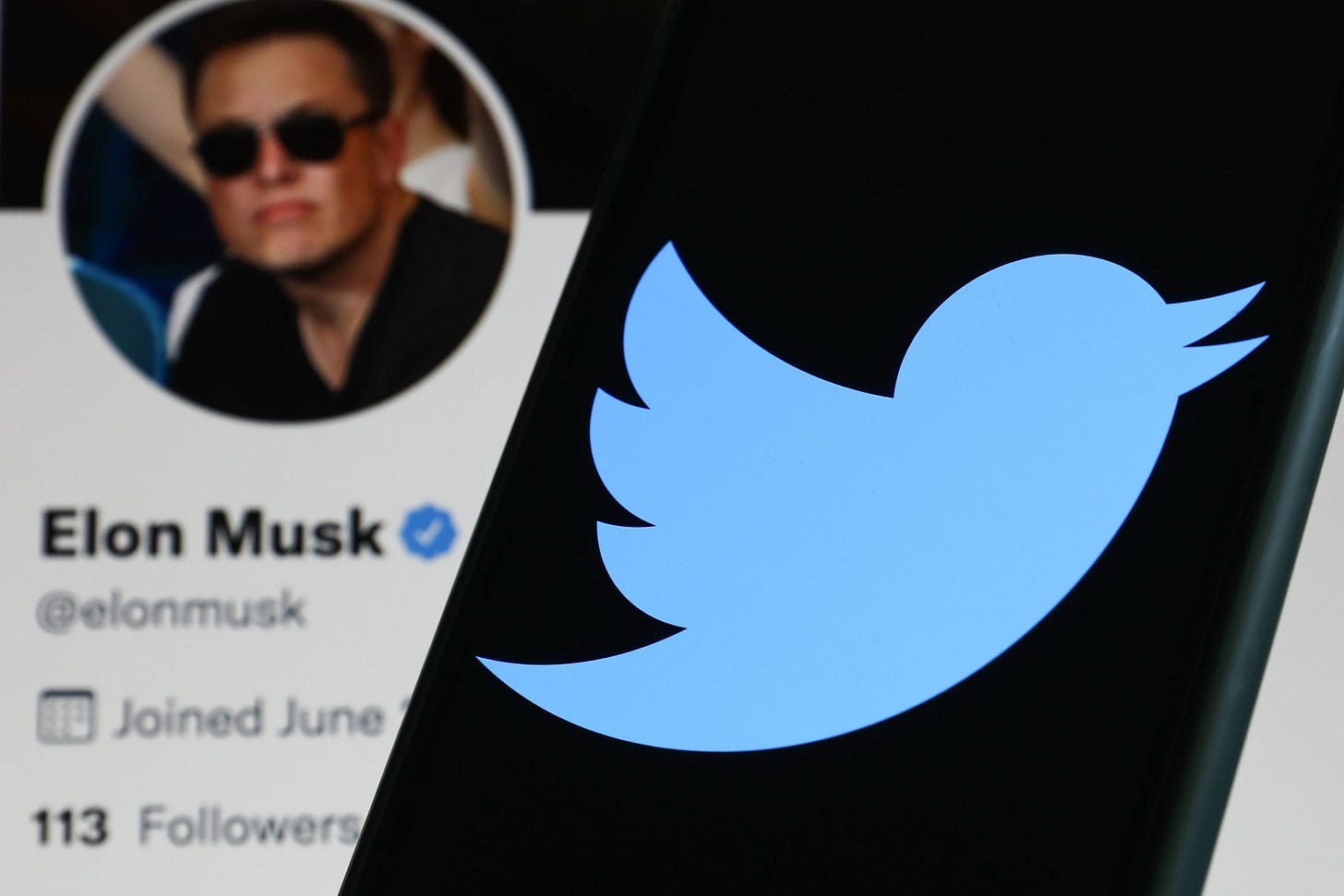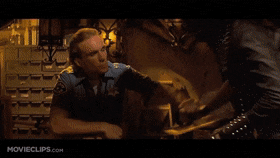Musk Twitter: Same Toilet, Different Plunger
Using Twitter all the time is like drinking a daily cocktail of Liquid Plumber and battery acid. Would that cocktail be worse if someone also peed in it?

Evidently some libs on Twitter are freaking out about the possibility of Elon Musk buying Twitter. As a result of this freakout, a bunch of cons on Twitter proclaimed that by purchasing Twitter, Elon Musk will Make Twitter Great Again. https://twitter.com/RepBoebert/status/1514592765023334405 Everyone is wrong. In the first place, they are wrong because Elon Musk probably isn’t going to buy Twitter any more than he was going to build an underground NY–Philly–Balt.–D.C. hyperloop. https://twitter.com/elonmusk/status/888053175155949572 There are things Elon Musk says and things Elon Musk does. His Twitter buyout plan seems pretty clearly in the first category. Why would he decide to spend his valuable time screwing around with a pretend Twitter takeover bid? Because this is an approximation of Musk’s relationship with the SEC:

But let’s pretend, just for a moment, that Twitter decided to sell and Elon Musk was the sole private owner of that hellsite, starting tomorrow. Would Musk make Twitter either awesome or awful? The answer is: How would anyone be able to tell?
Twitter is the worst place earth, the antimatter-universe analogue to Disney World. It is a virtual space where kindness, reason, manners, intelligence, style, and productivity go to die. There is no reason that anyone, anywhere, should be on Twitter unless they work in a field where having access to information a few minutes ahead of the general public is a necessity. For everyone else—literally, every man, woman, and bot in America—life would be materially improved by getting off of Twitter. What does Twitter give us? As I was writing, this was the big Twitter story of the day: https://twitter.com/NikkiMcR/status/1515130557675581442
Twitter can, occasionally, be a force for good. People can use it to raise money for good causes. Sometimes friendships are made on the platform. Twitter has made war reporting from Ukraine faster and expanded our scope of knowledge of what has been happening on the ground there in some ways. Everything in life is a cost-benefit analysis. And against those benefits, the distinguishing feature of Twitter—as opposed to, say, an RSS news feed—is that it beams the stupidest and most hateful comments from the worst people in the world directly onto your retinas. Why would you do that? Why would you volunteer to be an ad-watching, revenue generator for a service that does this? Maybe, if Twitter were paying you $1,000 a year to have a-holes say mean things to your face, it might be worth it. But every time you use the platform, you are paying Twitter. You reward the company with your engagement, which it then monetizes. Also, every time you use Twitter you are playing Russian roulette with your career. I do not believe that “cancel culture” is a large-scale threat to American society. But it is simultaneously true that:
1) People have lost their jobs after becoming the object of unfair Twitter mobs.
2) Twitter mobs can’t hurt bad actors—they only punish innocents or people who make one-off mistakes. Justine Sacco had her life ruined by Twitter. A guy like Mike Cernovich will never pay any sort of price for saying vile things on Twitter.
That’s because on Twitter, people are judged in shifting contexts. Therefore a random civilian tweeting something dumb can sometimes be held to the same moral and professional standards as, say, a progressive media personality when she is a victim of context collapse. But professional bad actors are only considered in the context of what they are. Their noxiousness is their shield.
Here is another cost: I don’t know you. I’m sure you’re a wonderful human being. A great wife/husband/brother/sister/friend. I bet everyone who knows you is better for having you in their life. But on Twitter, you are your worst self. You’re a jerk. Maybe not all the time. Maybe only, say, 10 percent of the time. (And that’s because you’re such a wonderful human being. An average person is terrible on Twitter 75 percent of the time.) Now imagine what would happen to you if you were that worst version of yourself 10 percent of the time in the real world. How many friends would you have? Would your colleagues enjoy working with you? How often would you get into fistfights? Why would you indulge in a habit that allows your worst self to emerge, even some of the time? Isn’t that bad for your soul? Isn’t it likely to lead you to more bad behavior over time? In his Orphan X books, Gregg Hurwitz’s protagonist has a mantra: “How you do anything is how you do everything.” That may not be universally true, but it’s true enough to live by. Oh, and don’t forget the opportunity cost. Every minute you spend on Twitter—or thinking about Twitter—is a minute you can’t be reading, or doing deep work, or having a catch in the yard with your kid. Most of us spend too much time draining the well and not enough time filling it. Is giving more of your attention, time, and energy to Twitter draining, or filling, your well?
So what would Twitter be like if Elon Musk owned it? What the libs fear and the cons covet is the idea that Musk would dismantle Twitter’s health and safety initiative, which seeks to blunt the worst aspects of Twitter in an attempt to . . . make the average user engage with the platform more and thus generate more revenue. In other words: People are worried (or excited) about Musk bringing all of the mouth-breathing racists, neo-Nazis, and assorted deplorables back from Gab and Parler and Gettr and welcoming them into Twitter like the prodigal Pepe. Would this be bad for the average user’s experience? Probably. Would you, as a power user of Twitter, even notice the effect of such a change? I kind of doubt it. Look at it this way: Being a regular participant on Twitter is the equivalent of drinking a cocktail made of Liquid Plumber and battery acid, every day. Would that cocktail be worse if someone also peed in it? I guess it would, in some sort of theoretical, metaphysical sense. But your GI tract wouldn’t know the difference. It’s getting destroyed either way.
Also: Even if Elon Musk bought Twitter (which, again, he probably isn’t going to do), he wouldn’t be able to do to the platform what everyone fears/hopes. Because you cannot run a mass-audience social platform without some sort of content moderation. Do away with all moderation and you get 4chan. If you want to be a mainstream platform you must have some form of moderation, otherwise the users leave. Even Gettr has a ToS that limits what users can do and say:
In December 2021, Gettr permanently suspended far-right commentator, a 23-year-old white nationalist and former YouTube personality Nick Fuentes. The site received backlash from Fuentes' fanbase, known as Groypers, as well as Arizona State Senator Wendy Rogers, who wrote, "What is the point of a free-speech alternative to Twitter ... that doesn't even honor free speech?” Gettr subsequently banned all use of the word "groyper" on the platform. A Gettr spokesperson said "The user in question violated Gettr's clearly defined terms of use and has been suspended from the platform."
Over the weekend, former Reddit CEO Yishan Wong wrote a lengthy Twitter thread explaining why moderation is inevitable on a mainstream social media site and why anyone who thinks Elon Musk would make Twitter better/worse misunderstands the dynamics at play. The entire thread is worth reading, but I’m going to give you some highlights:
All my alt/center-right/libertarian friends are CONVINCED the social media platforms uphold the woke BLM/Marxist/LGBTQ agenda and they ALSO have plenty of screenshots and evidence of times when...
— Yishan (@yishan) April 15, 2022
And the old GenX tech titans are right there with you - vaguely left-wing but also center-right - seeing their version of "censorship" - and drawing all the wrong conclusions from it about what's happening with the management of social platforms.
— Yishan (@yishan) April 15, 2022
I'm now going to reveal the institutional bias of every large social network (i.e. FB, Twitter, Reddit):
— Yishan (@yishan) April 15, 2022
They kind of care about money, but mostly they wish you would shut up and be civil.
— Yishan (@yishan) April 15, 2022
But that is impossible: they (we) made a platform where anyone can say anything, largely without consequence, so people are going to be their worst selves, and social networking is now The Internet, and everyone is on it (thank you @chamath), saying WHATEVER THE HELL THEY WANT.
— Yishan (@yishan) April 15, 2022
https://twitter.com/yishan/status/1514940462641020933
Because human variability and behavior is infinite. And when that happens, the social network has to make up a new rule, or "derive" it from some prior stated principle, and over time it's really just a tortured game of Twister.
— Yishan (@yishan) April 15, 2022
Here’s the absolute nub of it:
Replace "lab leak theory" with whatever topic you think has been unfairly censored, and the reason it was censored (or any other action taken against it) is not because of the content of that topic, I ABSOLUTELY ASSURE YOU. pic.twitter.com/2Eu87vIfGt
— Yishan (@yishan) April 15, 2022
*** We talk about “edge cases” like they’re these super-rare occurrences. But did you ever notice that we get edge cases on the internet (Wong calls them Omega Events) pretty much All. The. Time? https://twitter.com/yishan/status/1348548616076447746 That’s because when you have a few hundred million monkeys sitting around tapping on their phones for five hours a day, they do not eventually recreate the works of Shakespeare. Instead, they create QAnon and Pizzagate and Sonic porn and chemtrail theories and the Flat Earth Society. In sum:
Elon Musk isn’t going to buy Twitter.
If he did buy Twitter, Twitter would still suck.
No matter who owns Twitter, you are better off without it in your life.
Now do me a solid and go tweet this piece.


